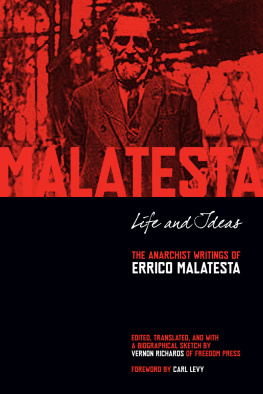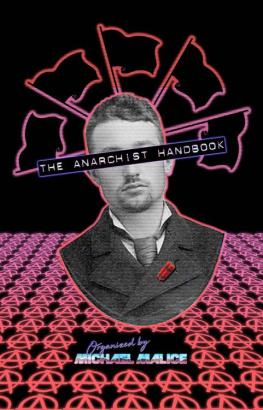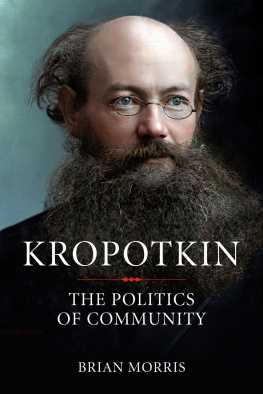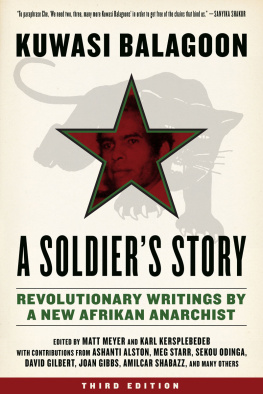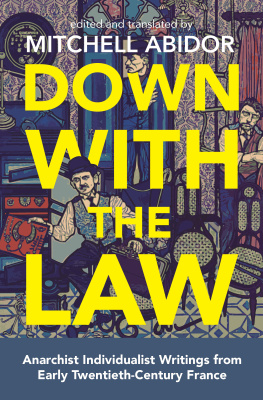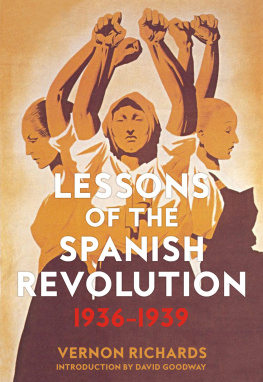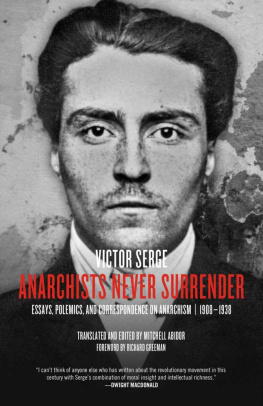Life and Ideas: The Anarchist Writings of Errico Malatesta
Edited and translated by Vernon Richards
ISBN: 978-1-62963-032-8
LCCN: 2014908067
Vernon Richards
Foreword Carl Levy
This edition copyright 2015 PM Press
All Rights Reserved
PM Press
PO Box 23912
Oakland, CA 94623
www.pmpress.org
Originally published by
Freedom Press
Angel Alley
84b Whitechapel High Street
London E1 7QX
www.freedompress.org.uk
Cover by John Yates/stealworks.com
Layout by Jonathan Rowland
10 9 8 7 6 5 4 3 2 1
Printed by the Employee Owners of Thomson-Shore in Dexter, Michigan.
www.thomsonshore.com
CONTENTS
F OREWORD
by C ARL L EVY
E RRICO M ALATESTA ( 18531932 ) WAS BORN IN S ANTA M ARIA C APUA Vetere near to Naples. His family were middle-class tannery owners, and he was not, as the press would have it, a count who conspired with other aristocrats such as Peter Kropotkin and Mikhail Bakunin. Malatesta lived between the era of the Paris Commune and Russian Revolution and the establishment of the Fascist dictatorship of Benito Mussolini. He knew Bakunin and Mussolini and was known and appreciated as a revolutionary (at least initially) by Vladimir Lenin. Although the young Malatesta was a key figure in the First International in Italy and elsewhere, his presence in Italy was mainly between 1885 and 1919, when his reappearances occurred during periods of popular unrest: the 189394 Fasci Siciliani, the risings of 189798, La Settimana Rossa (The Red Week) of 1914, and finally the Biennio Rosso (Red Biennium) of 191920.
For a large part of his adult life, Malatesta was an exile and spent nearly thirty years in London, then the capital of the capitalist world. Malatesta never finished his medical degree at the University of Naples and became an artisan: he trained as a gas-fitter and electrician, and between his stints as an organizer and radical newspaper editor he always returned to his trades, even in old age in Rome during the 1920s. Like the Russian populists he sought to declass himself and go to the people, and he feared and detested the development of a class of left-wing professional journalists, orators, and politicians who fed off the social movements and betrayed their principles.
Malatesta lived in a modern, globalized world of the steamship, the railroad, the telegraph, and dynamite.
Malatesta advocated the establishment of a national federation of anarchist groupingsinternationalists, anarchist socialists, and then plain anarchistsin Italy from the 1870s to the 1920s, and for this he received strong criticism and indeed abuse from the individualists, Stirnerites, and the affinity group anarcho-communist anarchists associated with his old comrade Luigi Galleani.
Trade unions were important for Malatesta. Although he never renounced the role of insurrection in making the revolution, by the 1880s and 1890s, with the massive London Dock Strike of 1889 in mind, he advocated a syndicalist strategy to the first generation syndicalist French anarchist exiles in London during the 1890s. When syndicalism grew worldwide in the early twentieth century he pointed out the theoretical and practical weaknesses of its workerism (the revolution was broader than that) and the fact that a peaceful general strike would merely result in the starvation of the urban working classes and the collapse of the strike if it wasnt brought to a quicker termination by the States armed forces and vigilante groups. When the factories of northern Italy were occupied in September 1920, Malatesta suggested that the workers recommence production and distribution links and not await events or negotiations. The modern city had to be restarted by the revolutionaries on their own initiative if the occupation was not to falter and lead to an inconsequential negotiated settlement.
But Malatesta did not ignore the countryside and, like Bakunin, saw the tremendous revolutionary potential in the peasantry, and some of his most widely read pamphlets were aimed at landless laborers and smallholders. Unlike the Italian Socialists in 191920, he warned against the promotion of the rapid socialisation of the land which drove the smallholders into the hands of the Fascists. A class war between the landless laborers and the smallholders was a war between the poor and the poorest and allowed Fascism to sweep away the Red Zones around Bologna and Ferrara in the spring of 1921; starting a rapid process to allow the former and largely discredited radical socialist Benito Mussolini in 1919, ascend to prime minister by the autumn of 1922.
Malatesta also argued that small-a anarchism was the only method by which the reformists had won their dubious victories: the expansion of the suffrage to the male British working class or the struggle for female suffrage in early twentieth century Britain, which Malatesta witnessed and had known many of the key personalities in the fight, had been won from the ruling classes through direct action not peaceful petition and rallies, he argued, over and over again. But he was not averse on occasion to forming alliances with moderate
The First World War brought a major split among the most famous personages of international anarchism, especially a fierce debate against Kropotkin, who not only endorsed the Entente and Allies but became a bitter-ender and demanded a continuation of the war in 1916, even when some senior British Tories were demanding a truce and a negotiated settlement. Malatesta remained opposed to the war and witnessed how the war reactivated the industrial radicalism of pre-war syndicalism in the factory council movements and free soviets of Italy and the wider world. One of Wards closest comrades in the post-1945 British anarchist movement was Vernon Richards.
Vero Benevento Constantino Recchioni was born in London in 1915 and later anglicized his name to Vernon Richards. He died in 1934, but his son Vero carried on the family politics.
Vernon Richards received his education at Emmanuel school in Wandsworth and then graduated in civil engineering from Kings College London in 1939. In his youth he was an accomplished violinist but later let this lapse. In 1934 he became active in the struggle against the Fascist regime of Mussolini and was deported from France where he fell in love with the daughter of the anarchist Camillo Berneri, Marie-Louise. Camillo Berneri was from the next generation of Italian anarchists after Luigi Fabbri and helped modernize its scope with important works on inter-war anti-Semitism, a critique of worker-worship and the adaption of the concepts of mass society, psychoanalysis, and totalitarianism for understanding the rise and strength of Fascism and Stalinism in the 1930s. He was murdered in Spain during the May Days of 1937 in Barcelona, most probably by Stalinist agents disguised as Spanish Republican Guards. Berneri had criticised the policies of the CNT-FAI: the joining of the Popular Front government, the lack of a guerrilla war, the sacrifice of the social revolution for a militarised war effort and the lack of a campaign to undermine Morocco, the original base of the Nationalists and the Army of Africa, by engaging in anti-imperialist agitation in the Spanish-controlled portion of that country. Before his death Emidio had helped Berneris various plots against Fascist and Royal luminaries. Vero/Vernon was deported from France in 1935 but not before a joint collaboration with Camillo Berneri and Marie-Louise Berneri on the anti-Fascist, newspaper, Free Italy/Italia Libera. When the Spanish Civil War began in 1936, he collaborated with veterans of Freedom, which had ceased effective publication in 1932, with the new fortnightly,
Next page
